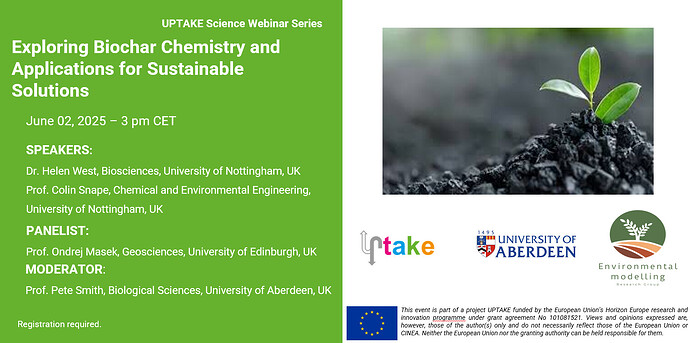The next UPTAKE Science webinar will explore biochar chemistry and applications for sustainable solutions.
Join us for an expert-led webinar that explores the multifaceted potential of biochar - from its chemical makeup to real-world field applications and policy implications. This session brings together leading researchers and practitioners to discuss how biochar contributes to soil health, climate mitigation, and circular economy strategies .
Please note that the event will start at 3 pm Central European Summer Time. (2 pm British Summer Time).
Speakers:
![]() Dr. Helen West, Biosciences, University of Nottingham
Dr. Helen West, Biosciences, University of Nottingham
![]() Field Application of Biochar for Soil Health and Carbon Sequestration
Field Application of Biochar for Soil Health and Carbon Sequestration
Dr. West will present case studies and field trials demonstrating how biochar is applied in agricultural systems, its influence on soil fertility, moisture retention, microbial activity, and its role in long-term carbon storage.
![]() Prof. Colin Snape, Chemical and Environmental Engineering, University of Nottingham
Prof. Colin Snape, Chemical and Environmental Engineering, University of Nottingham
![]() Decoding Biochar Chemistry: Structure, Stability and Carbon Sequestration Potential
Decoding Biochar Chemistry: Structure, Stability and Carbon Sequestration Potential
Prof. Snape will delve into the chemical composition of biochar, how feedstock and pyrolysis conditions influence its structure, stability, and how these factors affect its efficacy in carbon storage and soil interactions.
Panelist:
![]() Prof. Ondrej Masek, Geosciences, University of Edinburgh
Prof. Ondrej Masek, Geosciences, University of Edinburgh
![]() Linking Science and Practice: Scaling Biochar Deployment for Climate and Circular Economy Goals
Linking Science and Practice: Scaling Biochar Deployment for Climate and Circular Economy Goals
Prof. Masek will lead a broader discussion linking lab and field insights to real-world scaling challenges and opportunities for biochar. He will explore the policy, economic, and sustainability dimensions of biochar deployment, including integration with waste management, renewable energy, and carbon markets.
Moderator:
![]() Prof. Pete Smith, Biological Sciences, University of Aberdeen
Prof. Pete Smith, Biological Sciences, University of Aberdeen
![]() From research to Impact: Shaping a Sustainable Biochar Agenda for Climate Action
From research to Impact: Shaping a Sustainable Biochar Agenda for Climate Action
Prof. Smith will moderate the session, facilitating dialogue between science and
practice. He will frame the discussion in the broader context of carbon dioxide
removal strategies, land-use policy, and sustainable development, helping to identify
key research gaps, policy needs, and collaborative opportunities.2025-05-14T22:00:00Z
Program:
2.00 pm - 2.15 pm: Speaker 1: Dr Helen West
2.15 pm - 2.30 pm: Speaker 2: Prof. Colin Snape
2.30 pm - 2.45 pm: Panelist: Prof. Ondrej Masek
2.45 pm - 3.00 pm: Q&A Session
3.00 pm: Wrap up and closing
